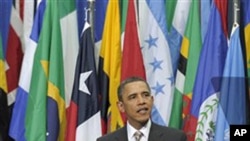President Barack Obama has challenged the people of Latin America to work with the United States to build a future marked by equal partnership, shared responsibility for economic progress, and support for democracy and human rights. The president spoke Monday in Santiago, Chile, the second stop of a three-nation Latin America tour.
Mr. Obama spoke in a country he says has become a regional and global leader, and which, during the last 13 months, experienced a devastating earthquake and tsunami, a major political transition, and the triumphant rescue of 33 trapped copper miners.
Mr. Obama is the first U.S. president in nearly 20 years to make a bilateral visit to Chile. His speech drew comparisons to one he delivered in Cairo in 2009 in which he proposed a new relationship with the Muslim world.
President Obama spoke at Santiago's Palacio de La Moneda Cultural Center with Chile's President Sebastian Pinera, three former Chilean presidents and diplomats from the region looking on.
Chile, he said, is but one example of how democracy has flourished in virtually all of Latin America.
"Across the region, we see vibrant democracies - from Mexico to Chile to Costa Rica," said President Obama. "We’ve seen historic peaceful transfers of power - from El Salvador to Uruguay to Paraguay. The work of perfecting our democracies, of course, is never truly done. But this is the outstanding progress that has been made here in the Americas."
"From Guadalajara to Santiago to Sao Paulo," Mr. Obama said, Latin American countries have lifted millions from poverty, while making tough but needed reforms, creating a new and more demanding middle class and contributing to global prosperity and security.
Calling Latin America more important than ever to the prosperity and security of the United States, the president spoke of a new vision for the Americas.
"Security for our citizens," said Obama. "Trade and development that creates jobs, prosperity and a clean energy future. Standing up for democracy and human rights. These are the partnerships that we can forge together here in the Americas and around the world."
Despite progress, Mr. Obama also spoke about what he called "enduring stark inequalities" and other realities that leaders in the region need to face.
"Political and economic power that is too often concentrated in the hands of the few, instead of serving the many," he said. "In the corruption that stifles economic growth, development, innovation and entrepreneurship. And in leaders who cling to bankrupt ideologies to justify their own power and who seek to silence their opponents because they have the audacity to demand their universal rights."
In a joint news conference, President Obama and President Pinera detailed new partnerships and agreements in areas ranging from renewable energy to expanded educational and student exchanges.
Mr. Obama praised Chilean leadership in the Americas, including in Haiti, and globally, including its participation in the Nuclear Security Summit hosted in Washington last year, and in a developing Trans-Pacific Partnership trade zone.
Responding to a reporter's question, President Obama said the United States stands ready to consider Chilean requests for information needed to investigate "past wounds" from the era of dictatorships.
"I think it’s very important for all of us to know our history," said Obama. "And obviously, the history of relations between the United States and Latin America have at times been extremely rocky and have at times been difficult. I think it’s important, though, for us, even as we understand our history and gain clarity about our history, that we’re not trapped by our history."
The president stressed that human rights and democracy need to be defended within countries and across the hemisphere, and said the Cuban government needs to respond to calls to improve its record.
"Going forward, we will continue to seek ways to increase the independence of the Cuban people, who I believe are entitled to the same freedom and liberty as everyone else in this hemisphere," he said. "I will make this effort to try to break out of this history that has now lasted for longer than I have been alive. But Cuban authorities must take some meaningful actions to respect the basic rights of their own people - not because the United States insists on it, but because the people of Cuba deserve it."
Mr. Obama also spoke of an event in Chile that held the attention of the world last year - the successful rescue of 33 miners.
That "global moment," he said, represented the capacity of people to meet challenges. And he connected it with the determination of people in the Americas to achieve their goals.
"When countries across Latin America come together and focus on a common goal, when the United States and others in the world do our part, there’s nothing we can’t accomplish together," said Obama. "This is our vision of the Americas. This is the progress we can achieve together. And this is the spirit of partnership and equality to which the United States of America is committed."
President Obama departs Chile Tuesday morning for El Salvador - the final stop on his five day Latin America tour.





